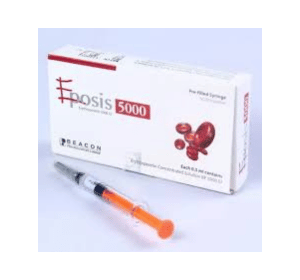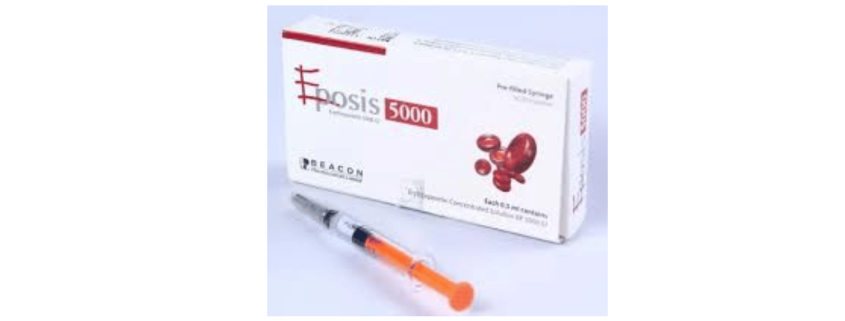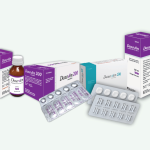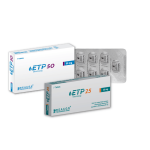Eposis
Generic Name:Erythropoietin Alfa

Indications
Eposis is an erythropoiesis-stimulating agent (ESA) indicated for:
Treatment of anemia due to:
- Chronic Kidney Disease (CKD) in patients on dialysis and not on dialysis.
- Zidovudine in HIV-infected patients.
- The effects of concomitant myelosuppressive chemotherapy, and upon initiation, there is a minimum of two additional months of planned chemotherapy.
Reduction of allogeneic RBC transfusions in patients undergoing elective, noncardiac, nonvascular surgery.
Prevention of anemia of prematurity in infants with a birth weight of 750 to 1500 gm and gestational age of less than 34 weeks.
Description
Eposis is recombinant human erythropoietin (EPO). It is expressed in Chinese hamster ovary cells and has a 165 amino acid sequence identical to that of human urinary EPO; the two are indistinguishable on the basis of functional assays. The apparent molecular weight of erythropoietin is about 30,400 daltons.
Dosage
Evaluation of Iron Stores and Nutritional Factors: Evaluate the iron status in all patients before and during treatment and maintain iron repletion. Correct or exclude other causes of anemia (e.g., vitamin deficiency, metabolic or chronic inflammatory conditions, bleeding, etc.) before initiating Erythropoietin alfa.
For all patients with CKD: When initiating or adjusting therapy, monitor hemoglobin levels at least weekly until stable, then monitor at least monthly. When adjusting therapy consider hemoglobin rate of rise, rate of decline, ESA responsiveness and hemoglobin variability. A single hemoglobin excursion may not require a dosing change.
- Do not increase the dose more frequently than once every 4 weeks. Decreases in dose can occur more frequently. Avoid frequent dose adjustments.
- If the hemoglobin rises rapidly (e.g., more than 1 g/dL in any 2-week period), reduce the dose of Erythropoietin alfa by 25% or more as needed to reduce rapid responses.
- For patients who do not respond adequately, if the hemoglobin has not increased by more than 1 g/dL after 4 weeks of therapy, increase the dose by 25%.
- For patients who do not respond adequately over a 12-week escalation period, increasing the Erythropoietin alfa dose further is unlikely to improve response and may increase risks. Use the lowest dose that will maintain a hemoglobin level sufficient to reduce the need for RBC transfusions. Evaluate other causes of anemia. Discontinue Erythropoietin alfa if responsiveness does not improve.
For patients with CKD on dialysis:
- Initiate Erythropoietin alfa treatment when the hemoglobin level is less than 10 g/dL.
- If the hemoglobin level approaches or exceeds 11 g/dL, reduce or interrupt the dose of Erythropoietin alfa.
- The recommended starting dose for adult patients is 50 to 100 units/kg3 times weekly intravenously or subcutaneously. For pediatric patients, a starting dose of 50 units/kg3 times weekly intravenously or subcutaneously is recommended. The intravenous route is recommended for patients on hemodialysis.
For patients with CKD not on dialysis: Consider initiating Erythropoietin alfa treatment only when the hemoglobin level is less than 10 g/dL and the following considerations apply:
- The rate of hemoglobin decline indicates the likelihood of requiring a RBC transfusion and,
- Reducing the risk of alloimmunization and/or other RBC transfusion-related risks is a goal.
- If the hemoglobin level exceeds 10 g/dL, reduce or interrupt the dose of Erythropoietin alfa, and use the lowest dose of Erythropoietin alfa sufficient to reduce the need for RBC transfusions.
- The recommended starting dose for adult patients is 50 to 100 units/kg 3 times weekly intravenously or subcutaneously.
Zidovudine-treated HIV-infected Patients: Starting Dose: The recommended starting dose in adults is 100 units/kg as an intravenous or subcutaneous injection 3 times per week.
Dose Adjustment-
- If hemoglobin does not increase after 8 weeks of therapy, increase Erythropoietin alfa dose by approximately 50 to 100 units/kg at 4- to 8-week intervals until hemoglobin reaches a level needed to avoid RBC transfusions or 300 units/kg.
- Withhold Erythropoietin alfa if hemoglobin exceeds 12 g/dL. Resume therapy at a dose 25% below the previous dose when hemoglobin declines to less than 11 g/dL.
- Discontinue Erythropoietin alfa if an increase in hemoglobin is not achieved at a dose of 300 units/kg for 8 weeks.
Patients on Cancer Chemotherapy: Initiate Erythropoietin alfa in patients on cancer chemotherapy only if the hemoglobin is less than 10 g/dL, and if there is a minimum of two additional months of planned chemotherapy. Use the lowest dose of Erythropoietin alfa necessary to avoid RBC transfusions.
- Adults: 150 units/kg subcutaneously 3 times per week until completion of a chemotherapy course or 40,000 units subcutaneously weekly until completion of a chemotherapy course.
- Pediatric Patients (5 to 18 years): 600 units/kg intravenously weekly until completion of a chemotherapy course.
- Prevention of anemia of prematurity: Erythropoietin alfa is administered subcutaneously at a dose of 3×250 IU/kg b.w. per week. Treatment should start as early as possible, preferably by day 3 of life. Premature infants who have received a transfusion before starting Erythropoietin alfa treatment are not likely to benefit as much as infants who have not had a transfusion. The treatment should last for 6 weeks.



